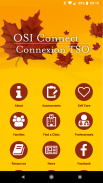







OSI Connect

Description of OSI Connect
OSI Connect is a comprehensive learning and self-management tool to assist Canadian veterans and RCMP community with common mental health concerns. Built for iPad, iPhone, Android, OSI Connect is portable and provides information and assistance at the touch of a button.
PTSD, anxiety, depression, and substance abuse are all types of operational stress injuries (OSI). Canadian veterans and RCMP need to know that OSI Clinics across Canada specialize in treating these conditions that come from combat, grief, high stress situations or operational fatigue. We are here to help you and your family.
Recognizing that you need help, and getting the help you need, takes real courage.
Check out the details to start feeling better soon.
An operational stress injury (OSI) is any persistent psychological difficulty resulting from operational duties performed during military or RCMP service. It includes a range of health problems such as anxiety disorders, depressive disorders, substance use and Post-Traumatic Stress Disorder (PTSD) as well as other conditions that may be less severe, but still interfere with daily functioning.
Many experiences can cause operational stress. Although active combat is certainly one of them, there are many other events that are part of the risk of serving in the military or RCMP that can cause such injuries. Taking part in search-and-rescue operations, being involved in a training accident, handling injured bodies, witnessing civilian atrocities or being involved in civilian disaster aid can all cause moderate to severe stress reactions. When these experiences interfere with a person's life, the result is an operational stress injury.
An OSI can affect others in the person's life, leading to marital and family problems. OSIs can also produce physical symptoms such as stomach upset, headaches, and sleep problems, and they can make chronic pain problems worse.
Canada has a network of specialized clinics designed to successfully treat operational stress injuries of veterans and RCMP. The clinics are committed to four key areas - assessment, treatment, networking and research in its efforts to understand and successfully treat clients and their families who have operational stress injuries.
Each clinic has a dedicated professional team that includes psychiatrists, psychologists, social workers, mental health nurses, and other specialized clinicians. They use their knowledge of the military and police cultures to develop personalized treatment plans in collaboration with each client. The spouse and close family members can also be involved in the treatment process.
Through this specialized treatment, clients address difficulties, develop treatment objectives, find resources, and improve their quality of life. While continuing to live in their community, clients attend periodic appointments at the OSI clinic except for the residential and inpatient stabilization treatment programs.
In addition to clinical assessment, clients are offered a variety of treatment options including individual therapies, group sessions, psycho-education sessions and access to other resources. Clients may be referred to an addiction treatment centre for specialized counselling services if alcohol dependency, substance abuse, or gambling difficulties require more intensive treatment.
Clients must be referred to one of the OSI Clinics by Veteran Affairs Canada, Canadian Forces or RCMP.
Regular and Reserve Members of Canadian Forces: Speak with your Medical Officer or Social Worker on the Base to discuss your concern.
Current members of the RCMP: Speak with your Health Services Officer or RCMP Psychologist.
Retired Canadian Forces or retired RCMP: Speak with Veterans Affairs Canada National Client Contact Centre at: English: 1-866-522-2122 French: 1-866-522-2022
To talk to a Peer Support Coordinator, call the Operational Stress Injury Social Support (OSISS) Program at 1-800-883-6094

























